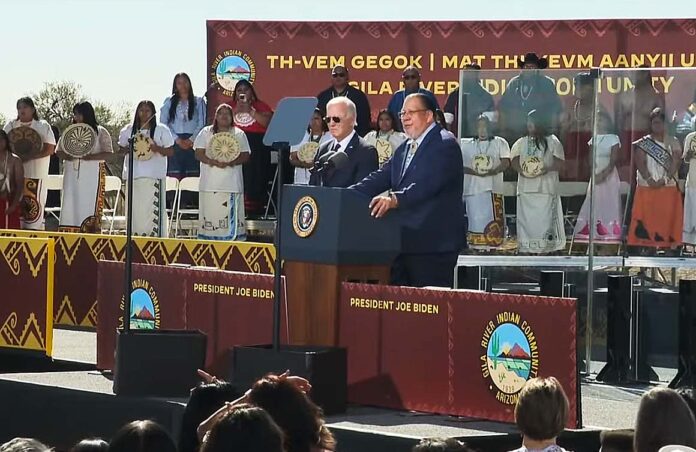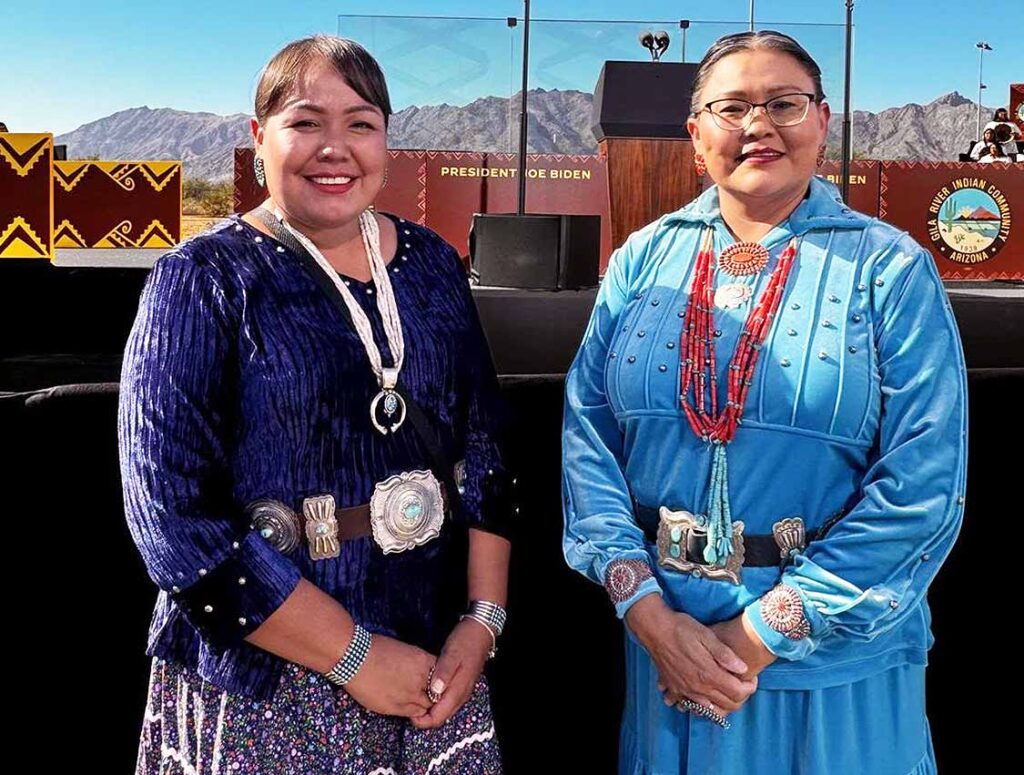
LAVEEN VILLAGE, AZ – Today, President Joe Biden acknowledged the somber legacy of Native American boarding schools in the United States, during an event held in the Gila River Indian Community. The event was marked by a formal apology from President Biden to survivors of boarding schools and their descendants, recognizing the lasting impacts of government policies that sought to strip Indigenous people of their languages, cultures, and identities through forced assimilation.
During his remarks, President Biden called for a moment of silence in remembrance of hundreds of thousands of Native American children who were impacted by the boarding school system that forcefully removed them from their homes, aiming to assimilate them into mainstream American culture. Generations of Indigenous children experienced loss of language, culture, and community. Many suffered physical and mental abuse, and many lost their lives.
“I formally apologize as President of the United States of America for what we did,” said President Biden. “It’s long overdue.”

Navajo Nation Speaker Crystalyne Curley, who was in attendance at the event, said that while the apology does not undo the generations of harm and devastation inflicted on Indigenous people, she commends President Biden for taking an unprecedented step toward healing and reconciliation. “President Biden’s apology is a critical acknowledgment of past injustices and wrongdoings by the federal government, and it lays the groundwork for continued healing,” said Curley. “This moment is both a recognition of what our children endured and a commitment to a better future where our voices, cultures, and traditions are protected and celebrated.”
Navajo Nation Council Delegate Eugenia Charles-Newton, who was also in attendance, emphasized that while an apology is significant, it must be accompanied by concrete actions to support Native communities. “This apology is a first step, but real progress will come when we invest more in tribal sovereignty, language revitalization, education, mental health support, and public safety,” said Charles-Newton.
The event brought together tribal leaders, boarding school survivors, and federal officials from across the country to witness a significant moment that highlights the resilience of Indigenous communities and the adversities endured by survivors and their families.
Numerous tribal leaders and U.S. Senators issued statements regarding President Biden’s remarks.
Tunica Biloxi Tribe of Louisiana Chairman, Marshall Pierite: “Today’s apology by President Biden on behalf of the United States government is both welcomed and long overdue. For decades, young Native Americans were taken from their families and placed in boarding schools against their will. As the investigation by the Department of the Interior demonstrates, young tribal citizens suffered unspeakable harms, with many dying in their custody – an undeniably dark period in the history of the United States. While today’s apology is a welcomed step, nothing can be done to bring back the young people lost or the threads of our cultural fabric that were taken away from us. With today’s apology, my hope is that all tribal nations will look forward and work together toward the shared goal of improving the lives of our tribal citizens and the communities around us. Indian Country is one built upon the principles of strength, perseverance, and the belief in a brighter future for all tribal citizens. The Tunica-Biloxi Tribe of Louisiana is committed to working with all tribal nations to build that brighter future, which will be done in honor of those we have lost, those that came before us, and all who have fought, and died, for the progress we seek.”
Oneida Nation Chairman Tehassi Hill: “We are hopeful that meaningful and better relations can be cultivated between the Indigenous nations and the United States government following the apology from President Biden. It is imperative that United States recognizes this painful history and its ongoing repercussions. Healing requires not only acknowledgment but also a commitment to support Native American communities in reclaiming their heritage and fostering resilience.” Looking forward Chairman Hill added, “We must work together to promote awareness, education, and reparative justice to honor the experiences of those affected and to ensure a future for the next seven generations that instills pride and confidence in our ancestry. We stand in solidarity with all Indigenous people on our journey toward healing and empowerment. We are encouraged the United States President has followed in suit as the Pope and Canandian leadership in acknowledging and apologizing for dishonor committed by their predecessors.”
Seneca Nation President, Rickey Armstrong, Sr.: “This is a day that many people thought would never come. More than a century after the United States began its policy of forced assimilation aimed at Native people, a President of the United States has officially acknowledged and apologized for the atrocities this country forced upon countless Native communities, families, and children – atrocities whose deep, damaging effects our communities live with to this day. President Biden’s apology on behalf of the United States is welcome and stirs a mix of emotions. The President’s words bring a measure of relief and validation that contribute in some way to the healing that survivors of the residential boarding school era and Native communities across the country continue to seek … President Biden’s words are appreciated. Now we need action that speaks far louder than words.”
U.S. Senate Committee on Indian Affairs, Chairman Brian Schatz: “For more than a century, the federal government’s Indian boarding school policies and practices stole hundreds of thousands of Native children from their homes in an effort to destroy Native languages, cultures, and identities. It’s an unconscionable chapter in our nation’s history, with a lasting legacy that continues to affect communities today. President Biden’s formal apology is a significant step toward confronting the dark history of these policies. Now Congress must act – the federal government also has a solemn responsibility to chart a path toward healing. Earlier this year, the Senate Committee on Indian Affairs advanced legislation to establish a federal commission to investigate, document, and acknowledge the historical injustices of the federal boarding school policies. Equally as important, the bill would provide crucial supports for survivors and their descendants. Passing this bill is a moral imperative, and I will continue to work with my colleagues to move quickly so we can begin to deliver the justice, closure, and support Native communities deserve.”
Senate Committee Vice Chairman Lisa Murkoswski: “I commend the President for his apology to all the survivors and Native communities, which continue to be impacted by the tragic legacy of the Indian boarding school era. This acknowledgement of the pain and injustices inflicted upon Indigenous communities, while long overdue, is an extremely important step toward healing. These actions reinforce the importance of confronting this egregious chapter in history and strengthens my resolve to get my legislation to create a Truth and Healing Commission signed into law.”
In June 2021, Secretary Haaland launched a comprehensive effort known as the Federal Indian Boarding School Initiative, to recognize the troubled legacy of past federal Indian boarding school policies with the goal of addressing the intergenerational impact and shedding light on past and present trauma in Indigenous communities.
The Department of the Interior released the second and final volume of their investigative report called for as part of the Initiative, which expands on the number and details of institutions to include attendee deaths, the number of burial sites, and participation of religious institutions and organizations. It also includes policy recommendations for consideration by Congress and the Executive Branch to continue to chart a path to healing and redress for Indigenous communities. The report showed that Navajo children experienced the greatest number of deaths than any other tribe during the boarding school era.














































